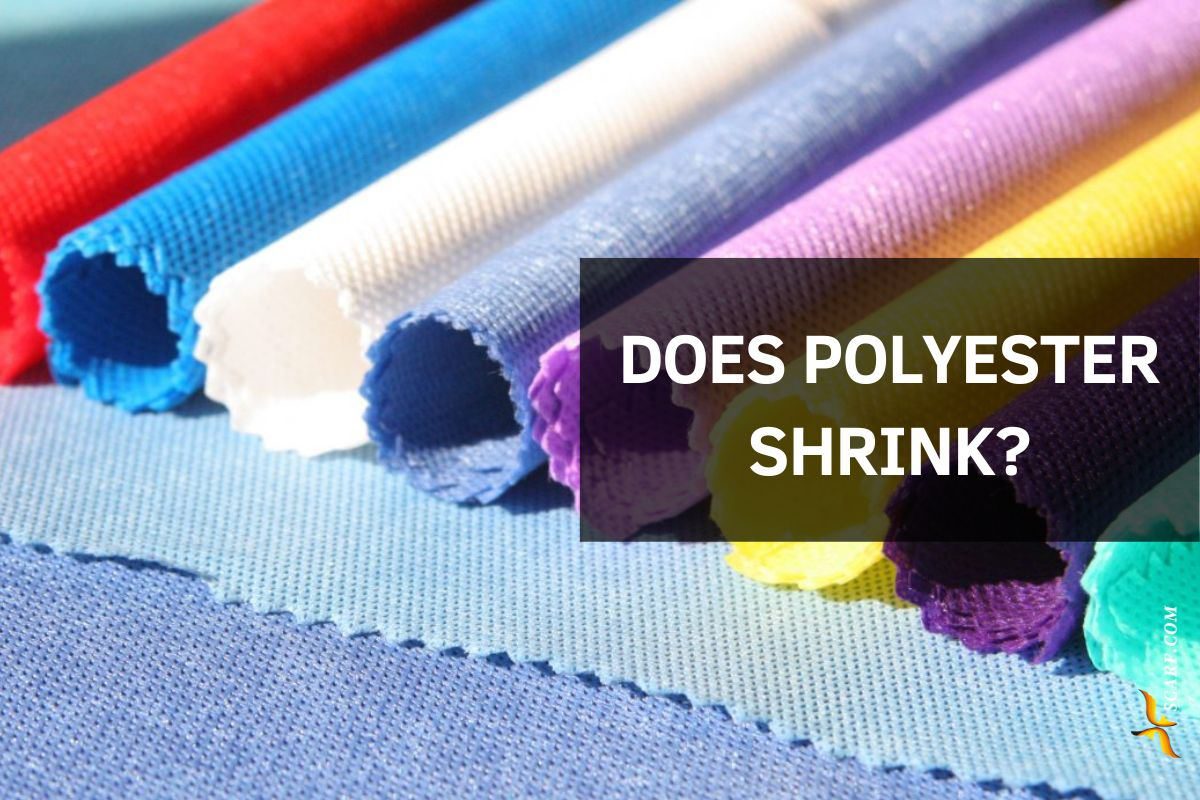Does polyester shrink? Polyester is a synthetic fabric that is widely used in the fashion industry due to its durability and wrinkle-resistant properties. Understanding the characteristics of polyester fabric is essential in determining whether it is prone to shrinkage.
Polyester is made from synthetic polymers and is known for its strength and resistance to stretching. It is a hydrophobic material, meaning it repels water and dries quickly. This is one of the reasons why polyester is favored in sportswear and outdoor clothing.
- Factors that Can Cause Polyester to Shrink
- Does Polyester Shrink?
- How to Prevent Polyester from Shrinking
- Proper Care and Washing Instructions for Polyester Clothing
- Tips for Resizing Shrunken Polyester Garments
- Alternatives to Polyester if Shrinkage Is a Concern
- The Advantages and Disadvantages of Polyester Fabric
- Conclusion: Final Thoughts on Polyester Shrinkage and Care
Factors that Can Cause Polyester to Shrink
While polyester is generally resistant to shrinking, certain factors can cause it to change in size. Heat is the most common culprit when it comes to polyester shrinkage. Exposing polyester to high temperatures during washing, drying, or ironing can cause the fibers to contract, resulting in shrinking. It is important to note that polyester fabric is more prone to shrinking than other synthetic materials such as nylon or acrylic.
Another factor that can contribute to polyester shrinkage is agitation. Vigorous washing or drying cycles can cause the fabric to rub against itself, leading to friction and potential shrinkage. It is advisable to wash polyester garments on a gentle cycle and avoid using harsh detergents or bleach.
Does Polyester Shrink?
Does polyester shrink? The answer to whether polyester shrinks is not a straightforward one. While polyester is less likely to shrink compared to natural fibers like cotton or wool, it can still shrink under certain conditions. The extent of shrinkage depends on various factors, including the quality of the fabric, the manufacturing process, and how it is cared for.
Lower quality polyester fabrics may be more prone to shrinkage due to their less stable construction. On the other hand, higher quality polyester fabrics are often pre-shrunk during the manufacturing process to minimize the risk of shrinkage. However, it is always advisable to check the care label of the garment for specific instructions on washing and drying to avoid any potential shrinkage.
Tips: Is Polyester Stretchy & Waterproof? What is Polyester Fabric?
How to Prevent Polyester from Shrinking
Although polyester is less likely to shrink compared to natural fibers, taking precautions during care and washing can help prevent shrinkage. Here are some expert tips to keep your polyester garments in top shape:
- Follow care instructions: Always refer to the care label on your polyester garments for specific washing and drying instructions. This will ensure that you are using the correct temperature, cycle, and detergent for your fabric.
- Use cold water: Washing polyester in cold water helps to minimize the risk of shrinkage. Cold water is less likely to cause the fabric to contract compared to hot water.
- Gentle cycle: Opt for a gentle or delicate cycle when washing polyester. This reduces the amount of agitation the fabric is subjected to, minimizing the risk of shrinkage.
- Air dry or low heat: Polyester garments should be air-dried whenever possible. If using a dryer, select a low heat setting to avoid exposing the fabric to high temperatures that can cause shrinkage.
- Avoid ironing: Polyester is a heat-sensitive fabric, and ironing can lead to shrinkage. If you must iron your polyester garment, use the lowest heat setting or consider using a pressing cloth to protect the fabric.


Proper Care and Washing Instructions for Polyester Clothing
Proper care and washing instructions are crucial for maintaining the integrity and appearance of polyester clothing. Here are some general guidelines to follow when caring for your polyester garments:
- Sort by color: Separate your polyester clothing by color to prevent color bleeding. This is especially important for vibrant or dark-colored garments.
- Turn inside out: Turning your polyester clothing inside out before washing helps to protect the outer surface and minimize friction.
- Use mild detergent: Choose a mild detergent specifically formulated for synthetic fabrics. Harsh detergents can damage the fibers and potentially cause shrinkage.
- Avoid bleach: Bleach should be avoided when washing polyester as it can weaken the fabric and cause discoloration.
- Hand wash delicate items: For delicate polyester garments, hand washing is recommended. Gently agitate the fabric in cool water and rinse thoroughly.
- Hang or fold properly: After washing, hang your polyester garments to air dry or fold them neatly to avoid creasing.
Cleaning methods for scarves made of other fabrics please click.
Tips for Resizing Shrunken Polyester Garments
In the unfortunate event that your polyester garment has already shrunk, there are a few techniques you can try to resize it:
- Soak in lukewarm water: Fill a basin or sink with lukewarm water and add a few drops of hair conditioner. Submerge the shrunken garment in the water and gently stretch it back to its original size. Leave it to soak for about 30 minutes before rinsing and air drying.
- Use a fabric stretching spray: Fabric stretching sprays are available in the market and can help relax the fibers of shrunken polyester garments. Follow the instructions on the product for best results.
- Take it to a professional: If all else fails, consider taking your shrunken polyester garment to a professional tailor or dry cleaner. They may have specialized techniques or equipment to restore the garment to its original size.
Alternatives to Polyester if Shrinkage Is a Concern
If you are particularly concerned about shrinkage and prefer to avoid polyester altogether, there are alternative fabrics to consider. Some options include:
- Cotton: Cotton is a natural fiber that is breathable and comfortable to wear. However, it is more prone to shrinking, so it is important to follow proper care instructions.
- Rayon: Rayon is a semi-synthetic fabric made from natural fibers. It has a soft and silky feel but can be prone to shrinkage if not properly cared for.
- Linen: Linen is a natural fabric made from flax fibers. It is lightweight, breathable, and less likely to shrink compared to polyester.
- Tencel: Tencel is a sustainable fabric made from wood pulp. It has a smooth and soft texture and is less likely to shrink compared to polyester.
The Advantages and Disadvantages of Polyester Fabric
Polyester fabric offers several advantages and disadvantages that should be considered before making a purchase. Some of the key advantages of polyester include:
- Durability: Polyester is a strong and resilient fabric that can withstand regular wear and tear.
- Wrinkle-resistant: Polyester is naturally wrinkle-resistant, making it ideal for travel or busy lifestyles.
- Quick drying: Polyester fabric dries quickly, making it a practical choice for outdoor and sportswear.
However, polyester also has its drawbacks:
- Heat sensitivity: Polyester is sensitive to high temperatures and can shrink or melt when exposed to heat.
- Lack of breathability: Polyester is not as breathable as natural fibers, which can lead to discomfort in hot and humid conditions.
- Static cling: Polyester can generate static electricity, causing garments to cling to the body or attract lint.
Conclusion: Final Thoughts on Polyester Shrinkage and Care
In conclusion, while polyester fabric is generally resistant to shrinking, it is not entirely immune. Factors such as heat, agitation, and poor quality can contribute to polyester shrinkage. By following proper care instructions, using the correct washing and drying techniques, and considering alternative fabrics, you can minimize the risk of shrinkage and keep your polyester garments looking their best.
Remember to always refer to the care label on your polyester clothing for specific instructions. If your polyester garment does shrink, there are techniques you can try to resize it, or you can seek professional help.
Ultimately, understanding the advantages and disadvantages of polyester fabric can help you make an informed decision when selecting clothing and other textile items. For more detailed information about polyester or if you want to customize fabric, please contact us.



